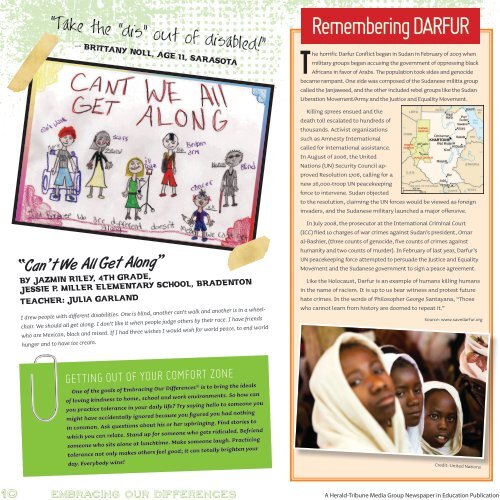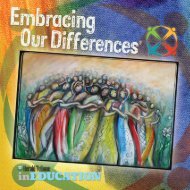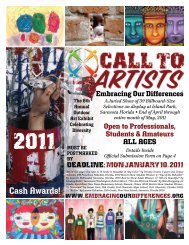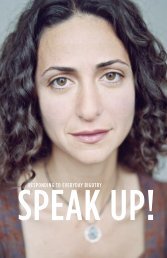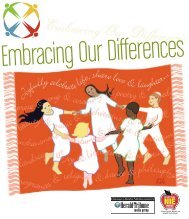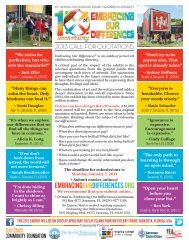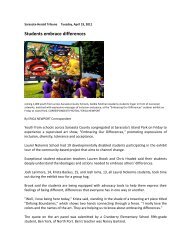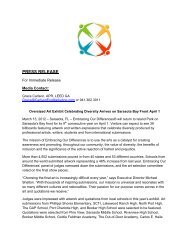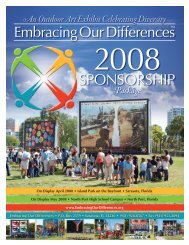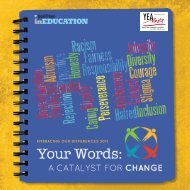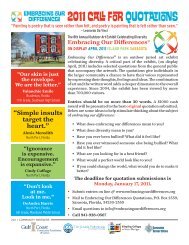Embracing Our Differences 2010
Embracing Our Differences 2010
Embracing Our Differences 2010
Create successful ePaper yourself
Turn your PDF publications into a flip-book with our unique Google optimized e-Paper software.
“Take the “dis” out of disabled!”<br />
Remembering DARFUR<br />
– Brittany Noll, Age 11, Sarasota<br />
“Can’t We All Get Along”<br />
by Jazmin Riley, 4th Grade,<br />
Jessie P. Miller Elementary School, Bradenton<br />
Teacher: Julia Garland<br />
I drew people with different disabilities. One is blind, another can’t walk and another is in a wheelchair.<br />
We should all get along. I don’t like it when people judge others by their race. I have friends<br />
who are Mexican, black and mixed. If I had three wishes I would wish for world peace, to end world<br />
hunger and to have ice cream.<br />
The horrific Darfur Conflict began in Sudan in February of 2003 when<br />
military groups began accusing the government of oppressing black<br />
Africans in favor of Arabs. The population took sides and genocide<br />
became rampant. One side was composed of the Sudanese militia group<br />
called the Janjaweed, and the other included rebel groups like the Sudan<br />
Liberation Movement/Army and the Justice and Equality Movement.<br />
Killing sprees ensued and the<br />
death toll escalated to hundreds of<br />
thousands. Activist organizations<br />
such as Amnesty International<br />
called for international assistance.<br />
In August of 2006, the United<br />
Nations (UN) Security Council approved<br />
Resolution 1706, calling for a<br />
new 26,000-troop UN peacekeeping<br />
force to intervene. Sudan objected<br />
to the resolution, claiming the UN forces would be viewed as foreign<br />
invaders, and the Sudanese military launched a major offensive.<br />
In July 2008, the prosecutor at the International Criminal Court<br />
(ICC) filed 10 charges of war crimes against Sudan’s president, Omar<br />
al-Bashier, (three counts of genocide, five counts of crimes against<br />
humanity and two counts of murder). In February of last year, Darfur’s<br />
UN peacekeeping force attempted to persuade the Justice and Equality<br />
Movement and the Sudanese government to sign a peace agreement.<br />
Like the Holocaust, Darfur is an example of humans killing humans<br />
in the name of racism. It is up to us bear witness and protest future<br />
hate crimes. In the words of Philosopher George Santayana, “Those<br />
who cannot learn from history are doomed to repeat it.”<br />
Source: www.savedarfur.org<br />
Getting Out of Your Comfort Zone<br />
One of the goals of <strong>Embracing</strong> <strong>Our</strong> <strong>Differences</strong>® is to bring the ideals<br />
of loving kindness to home, school and work environments. So how can<br />
you practice tolerance in your daily life? Try saying hello to someone you<br />
might have accidentally ignored because you figured you had nothing<br />
in common. Ask questions about his or her upbringing. Find stories to<br />
which you can relate. Stand up for someone who gets ridiculed. Befriend<br />
someone who sits alone at lunchtime. Make someone laugh. Practicing<br />
tolerance not only makes others feel good; it can totally brighten your<br />
day. Everybody wins!<br />
Credit: United Nations<br />
10 EMBRACING OUR DIFFERENCES<br />
A Herald-Tribune Media Group Newspaper in Education Publication


